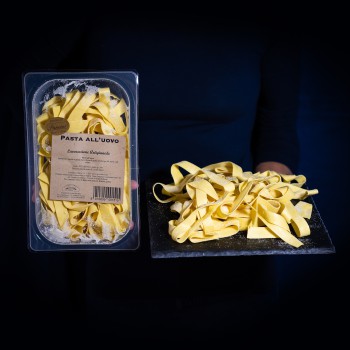


 Accepted payment methods. Secure checkout.
Accepted payment methods. Secure checkout. Pappardelle are pasta noodles similar to tagliatelle, but much wider - 13 mm wide, in order to better absorb the sauce. Pappardelle noodles originate from the region of Tuscany and are akin to tagliatelle, their cousins from Emilia-Romagna.
The Pancini family makes pappardelle by hand using extremely fresh eggs and stone-ground flour. By doing so, they obtain a tastier and more rustic texture which perfectly enhances the heartiness of meat-based and wild game sauces.
The 300g package serves 3 to 4 people. Since it is a fresh product, you can freeze the pappardelle and keep them in the freezer for three to four months. You can then cook them directly without needing to thaw them first.
They can be paired with:
Per 100g product
Energy kJ 1333 Kcal 316
Fat g 8.6
of which Saturates g 2.8
Carbohydrate g 48
of which Sugars g 0.5
Protein g 14
Salt g 0.37
Type “2” stone-ground common wheat flour, eggs, water, iodised salt.
WHEAT, GLUTEN, EGGS. May contain traces of milk, soya, sesame and nuts products.
That’s right, ragout remains Tuscan gourmets’ favorite seasoning. The reason is simple: fresh egg pappardelle have a rough and porous surface and the perfect length to catch the thickest sauces, ragout as well.
In the Maremma you can’t help but taste a nice dish of fresh pappardelle noodles with wild boar ragout. In Arezzo, try them with duck sauce (the so-called “nana”), even Artusi’s centre of gastronomic culture says it’s delicious. Are you around the Val di Chiana area? Then you better order some pappardelle with chianina beef ragout, the dish itself is worth the ride.
We spoke about thick sauces, but don’t think that vegetables aren’t perfectly suitable for our purpose. The only important thing is to do things according to the seasonality. Eggplants in January and artichokes in July are off-limits, don’t waste your money on bland vegetables that have crossed the ocean to get on your table.
So here’s my personal fresh egg pappardelle with vegetarian sauces top4:
Another great way to celebrate egg pappardelle noodles. Of course you’ll need excellent cheeses and a little caution if you want to make fondues.
Here are my suggestions:
You didn’t expect this one, did you? And yet pappardelle noodles are also great with fish, especially with shellfish and seafood.
A main course you should definitely try is pappardelle noodles with shrimps and pistachio, the Bronte variety of course. While remaining in Sicily, how about some nice pappardelle noodles with swordfish, cherry tomatoes and capers?
And for seafood lovers, pappardelle noodles with mussels, clams and cockles. Make sure you take a napkin to prevent the inevitable splashes and you’re good to go.
A rich and delicious dish, with a thousand variations and the great advantage of being able to prepare it well in advance.
The crispy crust that forms under the grill is simply gorgeous, even better with an abundant and enveloping sauce.
You can season your pappardelle noodles with tomato and bechamel sauce, with cooked ham and a Parmigiano Reggiano fondue, or with sausage, leeks and smoked provola cheese. Do not limit your creativity.
Fresh egg pappardelle are one of the most typical pasta shapes of Tuscany. Technically speaking we can simply define them as long, fresh, egg pasta noodles, but to really explain them what we really need is a bite.
Because it takes a first-hand experience to imagine the pappardelle’s rough and porous surface, the rustic consistency given by their thickness, around 8 millimeters, and the unmistakable taste of fresh eggs.
However, if words aren’t enough to explain their goodness, we can share with you a few tips and some supertried and tested recipes to bring a perfect main course to the table. But let’s start from the beginning.
Tagliatelle are to Emilia Romagna just like pappardelle are to Tuscany. As the name suggests, pappardelle come from the typical Tuscan word “pappare”, which means to eat with relish.
Pappardelle’s date of birth isn’t clear, but we are able to say with some certainty that they were already regularly consumed during Medieval times in Tuscany.
Boccaccio mentions them in the Decameron, coincidentally while describing the land of Cockaigne. In fact, if we have to think of a bonanza of a dish, pappardelle noodles are on top of our list.
In the sixteenth century a cook named Domenico Romolo - “Il Panunto” was his nickname - inserts them in his cookbook “La singolar dottrina”. He also comes up with the recipe for pappardelle “alla Fiorentina” soup, a complex and refined dish reserved to none other than the Roman cardinals.
Even Pellegrino Artusi includes fresh egg pappardelle in his cookbook “Science in the Kitchen and the Art of Eating Well” and provides us with two versions, with hare or “all’aretina” from Arezzo.
The most interesting one is the Arezzo version, although the recipe is preceded by a warning from the cook himself: “I present this not as a refined dish, but as one suitable for family cooking”.
In fact, there’s very little refinement here. First of all you need a domestic duck, then some ham and some celery, carrot and onion sautéed in butter, not in oil. Afterwards you need a big piece of spleen – veal or beef – that has to be scraped and cooked with the duck, with a final touch of tomato and nutmeg.
What’s cool about it is that the duck is served as a second course, because the cooking juices are what is used to season the pappardelle, the remaining gravy in the pan and only the chopped duck’s liver.
Let’s fast forward to the present times. How can we cook the pappardelle in a tasty but a little easier way? Here are 5 recipes to fit every taste!